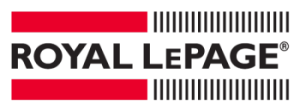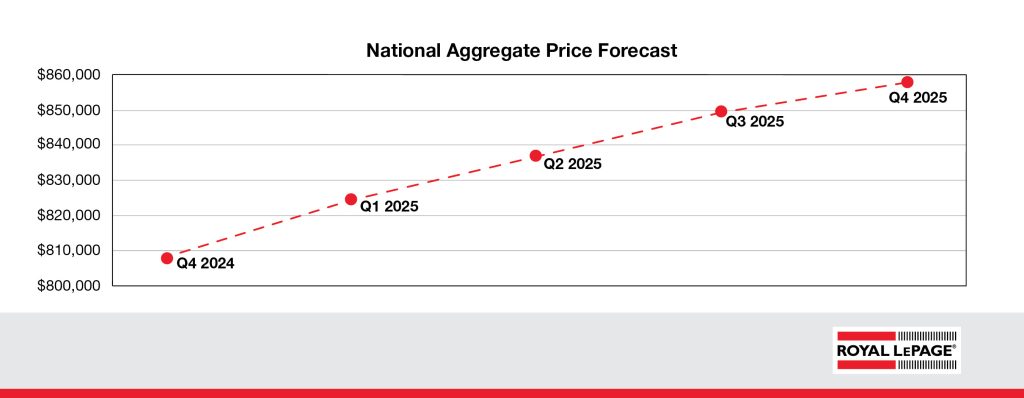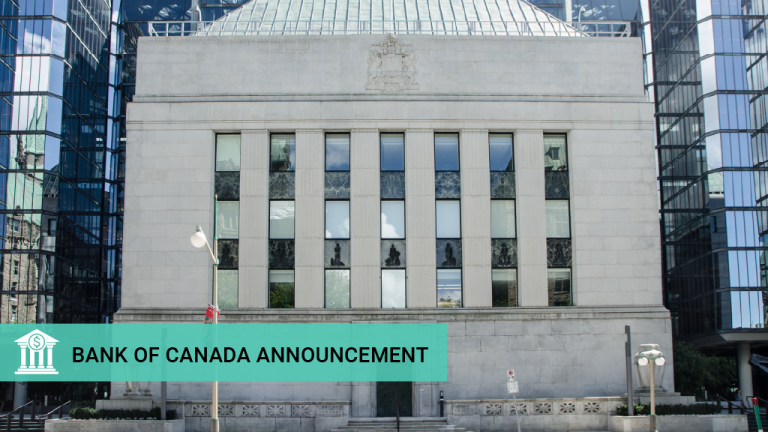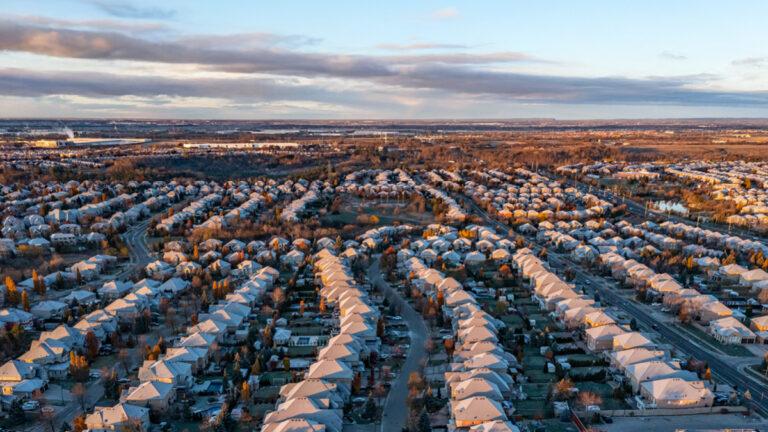
For the last few years, the Canadian housing market has experienced trends far outside the norm. A global pandemic, rapidly rising interest rates and economic disruptions threw the real estate market off course for a time, but 2025 is expected to bring conditions back in line with long-term historical averages.
According to the Royal LePage Market Survey Forecast, the aggregate1 price of a home in Canada is set to increase 6.0% year over year to $856,692 in the fourth quarter of 2025, with the median price of a single-family detached property and condominium projected to increase 7.0% and 3.5% to $900,833 and $605,993, respectively.2
“After several years of unusual volatility in the real estate market, key indicators point to a return to stability in 2025. The backlog of willing and able buyers continues to grow, and upcoming changes to mortgage lending rules will further enhance Canadians’ borrowing power,” said Phil Soper, president and chief executive officer, Royal LePage. “Most notably, the Bank of Canada’s shift from ‘inflation fighter’ to ‘economy booster’ has taken time to influence buyer behaviour. We saw a marked increase in market activity at the start of the fourth quarter, following the Bank of Canada’s 50-basis-point rate cut. Buyers now believe home prices have hit bottom and are eager to act before competition intensifies.”
New lending rules to boost buyer borrowing capacity
A series of new lending regulations are set to take effect this month, offering greater accessibility to both first-time buyers and current homeowners. As of December 15th, eligibility for 30-year amortizations on insured mortgages will be expanded to all first-time homebuyers and to all purchasers of new construction properties, up from the current 25-year threshold.3 In addition, the mortgage insurance cap will increase from $1 million to $1.5 million, allowing buyers with a down payment of less than 20 per cent the opportunity to explore housing options at a higher price point. This will be especially impactful for homebuyer hopefuls in the country’s priciest real estate markets, where average property values often exceed $1 million.
“Improved lending conditions, combined with declining interest rates, will unlock new housing opportunities for many Canadians in the new year. First-time buyers will be the primary beneficiaries of these initiatives, as their ability to borrow more for less with a smaller down payment will help bring them closer to their first home purchase,” said Soper. “We believe the return of buyers to the market will encourage builders and trigger a wave of new supply, which is very much needed.
“Addressing Canada’s critical housing shortage must remain a top priority for policymakers at every level of government. With our population growing rapidly through both natural increases and immigration, it is essential to stay focused on supporting the development of new homes if we hope to address housing affordability, be it for purchase or rent.”
Changing political landscapes create potential impact for housing
2025 will bring a change in government south of the border, and potentially in Canada’s House of Commons. New leadership, in addition to evolving trade relations, immigration policies and global conflict, could meaningfully alter the state of the Canadian housing market.
“With an election approaching in Ottawa and a new administration preparing to take office in Washington, the housing market faces potential disruptions. Here at home, a federal election will see new housing policies that may temporarily impact market activity in the second half of 2025,” said Soper. “Meanwhile, south of the border, the incoming Trump administration’s trade policies and broader economic agenda have the potential to create ripple effects for Canada’s economy and housing market. While these impacts may take time to unfold, they could eventually affect consumer confidence and market dynamics on both sides of the border.”
Read Royal LePage’s 2025 Market Survey Forecast for national and regional insights.
Highlights from the release:
- Greater Montreal Area aggregate home price appreciation (6.5%) expected to outpace greater regions of Toronto (5.0%) and Vancouver (4.0%) next year.
- Quebec City is forecast to see the highest gains among all major regions in 2025, with the aggregate home price expected to rise 11.0%, followed by Edmonton and Regina at 9.0%.
- Calgary, which saw unprecedented price appreciation and sustained activity over the last two years, is forecast to see home prices increase a moderate 4.0%, along with Ottawa, Halifax and Winnipeg.
- Median price of a condominium in the Greater Toronto Area expected to decline modestly by 1.0%, with thousands of new units to be added to the current surplus of supply.
1Royal LePage’s aggregate prices are calculated using a weighted average of the median values of all housing types collected.
2Price data, which includes both resale and new build, is provided by RPS Real Property Solutions, a leading Canadian valuation company. Price forecast reflects Q4 2025 over Q4 2024 projections.
3Federal government announces landmark adjustments to mortgage rules for first-time buyers in Canada, September 17, 2024







